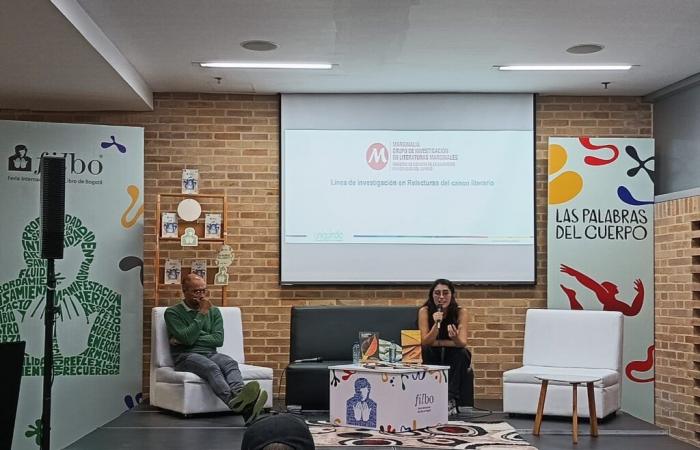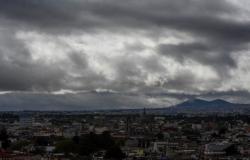Shara Well, graduated from the University of Quindío, represented the department in Filbo 2025
Shara María Bueno Ramírez has an artistic career that covers poetry, cultural management, edition, photography, digital illustration and audiovisual content production. It is graduated in Social Communication – Journalism by the University of Quindío and has a specialization in Content Creation, Digital Marketing and Electronic Commerce of Platzi. Recently, he participated in the Bogotá International Book Fair.
He was born on April 9, 1999 in Armenia, Quindío. Throughout his career, he has participated in both national and international poetry festivals, as well as the International Poetry Festival of Cali, the meeting of noism in Medellín and various events in Peru and Colombia, where he has been summoned as speaker and jury.
He has published several poetry fanzines, among which are secrets under the bed (2018), memories of an ungrateful (2019) and I swear that I tried to abandon poetry (2023), in addition to collaborating in several magazines and newspapers, such as the Chronicle of Quindío, the Quindian and Literary Calarcá. It has also been included in poetry anthologies of Colombian women and in publications such as dying is a country that loved editorial beetle.
Recognition
Among his recognitions and awards are the second place in the departmental contest of Poetry Casd (2014), third place in the contest a look at Oaxaca, his selection in art follows 2021 by Corpocultura, as well as awards for cultural management in Armenia and Quindío. In addition, she is the founder of Quindío Literary, a portal of digital literature and alternative literary products store.
-We speak about your participation in the 2025 filbo.
My participation in the Filbo was carried out thanks to the invitation of the Ministry of Culture of the Government of Quindío, from the management of Felipe Robledo and under the direction of Liliana Moreno, who was in charge of all the logistics related to the participation of the Quindío stand. Specifically, I attended to participate in two spaces on Thursday, May 1.
The first space was a conversation about the Library of Quindian authors (BAQ), in which Professor Edwin Vargas exposed the motivations and trajectory of this project, and then conversing with me about my experience as the winning author of the 2024 call. In this talk, I also shared my experience as a reader of the BAQ and the different obstacles that have been presented year after year – including this year, in which we still do not Printed books of the winners 2024.
In addition, I approached the deficiencies in the project dissemination strategies, as well as the delay in the digitalization process, which has been on the table for seven years but, so far, has failed to advance. This has prevented taking advantage of the resource to reach more people and has contributed to the social recognition of the project in Quindío being limited. Access to books is extremely difficult and, on many occasions, these end up being given in spaces that are not related to the cultural or literary field.
On the other hand, I made it clear that, although I consider that BAQ is an extremely valuable project for being a testimony of the literary production of our department, from my position as a reader and author, it is not generating the impact I believe should have. I mean that I should reach the inhabitants of Quindío – the schools, universities, public, rural and itinerant libraries – in an attractive and strategic way, in order to effectively impact Quindian citizenship, which I think should be the main beneficiary.
The second space was for the “poetic shopkeeper of Quindian authors”, which consists in setting up a position similar to a clothing shopkeeper, but with poems and data from poets of the department. Subsequently, a recital was made, in which there was an open microphone so that the participants could read the poems that were on the tendard.
-As the purpose of the Quindian authors library, tell us about the work that you are going to publish in that collection.
“Warm water cloths” is a poems that is born of physical and emotional pain and tenderness as a form of resistance. It is a metaphor of those care gestures that do not cure at all, but that they hold. I wrote these poems after a difficult process of health and creative frustration, in which I asked myself if continuing to create made sense. The book collects that transit: from anger to tenderness, from silence to writing, from pain to the possibility of play. It is a poetic scarf box for those who need them, as I need them.
Additionally, this poems incorporates illustrations of my authorship, which are part of “the game room”, as I call that space that daily I try to dedicate to creation, where there are different activities: write, draw, photograph, devise dynamics, etc. And that according to the mood and at the time I have to dedicate you to choose one of those activities every day.
-In his artistic and cultural work one can warn that different roles converge: poet, editor, cultural manager, among others. How was this experience?
Currently, I consider myself an integral artist, taking into account the creative habit that I try to strengthen through the concept that I mention as “game room.” I walked this path after giving up cultural management. My experience in this area has been extremely enriching, since I have taken poetry as the nucleus of my different proposals, which include fanzines, activities such as poetic tendard, dynamics such as “blindly appointment with a poem”, artistic facilities and photographic exhibitions. These experiences have allowed me to devise new ways to create, get and bring people closer to poetry through creative and strategic proposals.
As for my experience in cultural management, although it helped me to understand the different dynamics and structures necessary to carry out a cultural event – as I succeeded with Synesthesia, poetic and musical recital (which included poetry recitation, plays and musical samples), reaching its fourth version – also left me feelings found. On the one hand, a great satisfaction for the excellent reception in each edition. On the other hand, the frustration that it is extremely difficult to manage cultural projects when the resources or legal figures necessary to access calls are not available. In addition, it requires having a truly committed team, since a working group is needed to realize this type of initiatives.
All this led me to face the reality of the artist’s precariousness and from whom they are part of this ecosystem. Although I tried to pay from my pocket food expenses for artists, lodging, or the publication of each fanzine or magazine for events, and even created a store that helped hold these expenses, it was never enough. I could not pay fees to the artists, and although in the latest version I managed to pay a small sum to the members of the work team, it was not enough. All this caused him to end up renouncing cultural management, with a feeling of immense frustration.
How has it been important for you to link poetry and urban or daily experiences in your works? How has this configured his gaze on art and poetry?
I must recognize that I am greatly excited the literature that portrays places, which incorporates those palpable elements of urban reality, regardless of what it is. Whether in novels, stories or poems, I consider that my training in social communication and journalism has also led me to develop a particular sensitivity towards social, political and cultural issues, and that is reflected in my poetic work. Linking poetry with urban and daily experiences is not just a thematic resource for me; It is a way to place myself as a citizen, as a woman and as an artist in front of an environment that constantly challenges me. This has shaped my vision of art and poetry, because it has taught me that poetry is not isolated in a pedestal nor does it exist for an elite. On the contrary, he is alive in the common spaces, in the anonymous voices, in day -to -day basis and beauties.
In addition, I have come to understand that art has a political and collective dimension; that poetry can generate conversation and mutual recognition; and that it has the power to resonate even in those who do not share exactly my context. I have found it through the comments of readers and listeners, who, although they do not live in Armenia and are even in other countries, find in my poems something that speaks to them and motivates them to share. For me, this shows that the local can be universal and that art is a way to connect individual experiences with collective emotions and reflections.






